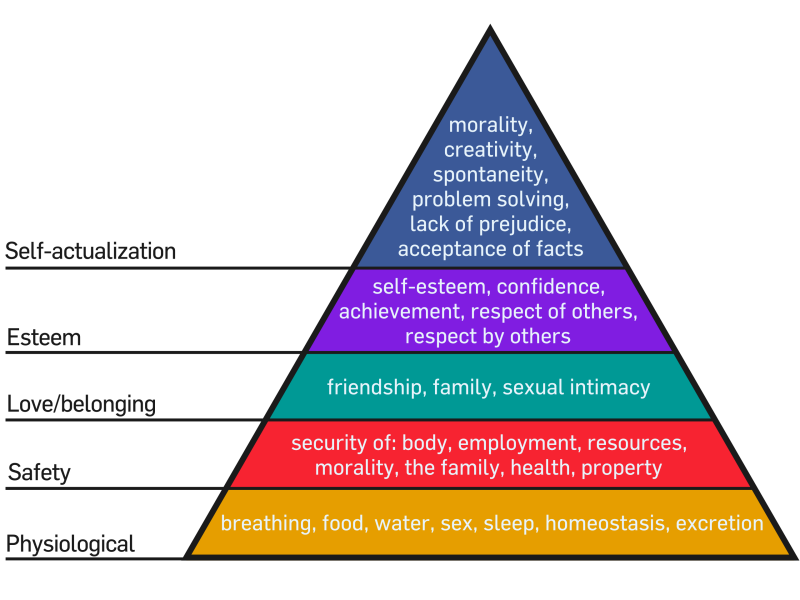We rush through days fuelled by caffeine and to-do lists, and before we know it, we’ve skipped meals, forgotten to breathe, and haven’t seen daylight in hours. I know I do this anyway at times.
But here's the thing: our basic needs matter. Not just the big, deep therapy stuff—but the simple, everyday things too. And if we ignore those needs for too long, it starts to show up in our mental health and create problems.

Diagram of Maslow’s Hierarchy of Needs by J. Finkelstein, licensed CC‑BY‑SA 3.0 via Wikimedia Commons
Maslow’s Hierarchy of Needs (Made Simple)
You might’ve heard of Maslow’s Hierarchy of Needs (find out more here). It’s a pyramid that shows what humans need to thrive—starting with the essentials and building up to growth and fulfilment. See above a photo what it includes- you might be surprised.
Each level builds on the one below. If the lower layers aren’t being met, it’s harder to focus on the ones above.
Let’s start to break it down and why it is important!
1. Basic Physical Needs
Think food, sleep, water, and rest.
Sounds simple, right? But how often do you push through tiredness or skip meals when you're stressed? Its amazing how much these things impact us if we aren't getting the basics. Think 'hangry' or complete lack of sleep. It can impact your mood to your energy to your ability to think clearly. You might feel more anxious, irritable, or low without even knowing why.
These basics affect your mood, energy, and outlook. Some of the first questions i ask my clients are; 'Hows your sleep?' 'What does your diet look like?' and 'Who have you got at home?'.
2. Safety and Stability
Do you feel safe—at home, at work, in your relationships?
Safety isn’t just about physical danger. It’s also about feeling emotionally secure and financially okay. Financial worries, a chaotic environment, or past trauma can all create a sense of insecurity. This keeps your nervous system on high alert. Stability and finances being a particularly rocky area for many people at the moment.
When things feel shaky, it’s hard to focus on anything else.
3. Love and Connection
We all need to feel like we belong.
That could mean close friendships, a supportive partner, or just feeling seen.
If you're feeling lonely or disconnected, you're not alone. You would be surprised how many clients feel alone, isolated, disconnected and unable to form trusting friendships—therapy can gently explore those experiences.
Often, what we long for most is to feel like we belong. Much like being a tribe back in cave person times.
4. Self-Esteem and Confidence
Do you believe you matter? Do you speak kindly to yourself?
Low self-esteem can quietly impact every part of life—from work to relationships to your sense of purpose. When self-esteem is low, it’s easy to doubt your worth or question your value. You might notice patterns of people-pleasing, perfectionism, or self-criticism.
When in therapy you can start to understand where those beliefs came from—and how to change the story. Bit by bit, you can start to feel more secure in who you are.
5. Purpose and Fulfilment
This is the top of the pyramid—what Maslow called self-actualisation.
Self-actualisation doesn’t mean being perfect. It’s about becoming more of who you already are, living in line with your values, and creating a life that feels true to you.
Create strong foundations below and you can start to ask;
What gives your life meaning?
What makes you feel fully alive?
Who are you, when no one’s watching?

When one layer of needs isn’t being met, everything else can feel harder. The more layers missing or areas being ignored/forgotten the closer to burnout and everything toppling over.
Feeling low, anxious, overwhelmed, or stuck?
Irritable? Angry?
It might be your mind’s way of telling you something’s missing or that you are forgetting to do something to replenish yourself. Not because you’re broken—but because you’re human.
One thing to remember and take away from this blog...
Take a moment. Ask yourself:
-
Am I sleeping and eating enough?
-
Do I feel safe—emotionally and physically?
-
Who do I feel connected to?
-
Do I like how I speak to myself?
-
What gives my life meaning lately?
There are no right answers. Just honest ones. And if you’re not sure where to start, therapy can help you figure that out—without pressure or judgement.
Final Thoughts
Meeting your basic needs isn’t selfish. It’s survival. Its human.
And once those needs are seen and supported, you can start to feel more like you again.


Add comment
Comments